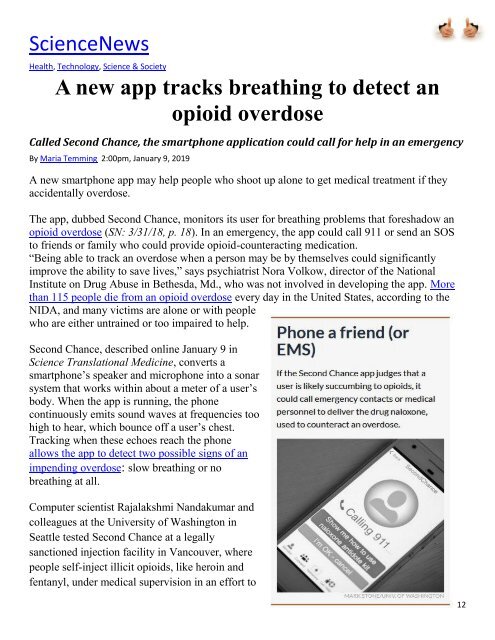You also want an ePaper? Increase the reach of your titles
YUMPU automatically turns print PDFs into web optimized ePapers that Google loves.
Scien<strong>ce</strong>News<br />
Health, Technology, Scien<strong>ce</strong> & Society<br />
A new app tracks breathing to detect an<br />
opioid overdose<br />
Called Second Chan<strong>ce</strong>, the smartphone application could call for help in an emergency<br />
By Maria Temming 2:00pm, January 9, <strong>2019</strong><br />
A new smartphone app may help people who shoot up alone to get medical treatment if they<br />
accidentally overdose.<br />
The app, dubbed Second Chan<strong>ce</strong>, monitors its user for breathing problems that foreshadow an<br />
opioid overdose (SN: 3/31/18, p. 18). In an emergency, the app could call 911 or send an SOS<br />
to friends or family who could provide opioid-counteracting medication.<br />
―Being able to track an overdose when a person may be by themselves could significantly<br />
improve the ability to save lives,‖ says psychiatrist Nora Volkow, director of the National<br />
Institute on Drug Abuse in Bethesda, Md., who was not involved in developing the app. More<br />
than 115 people die from an opioid overdose every day in the United States, according to the<br />
NIDA, and many victims are alone or with people<br />
who are either untrained or too impaired to help.<br />
Second Chan<strong>ce</strong>, described online January 9 in<br />
Scien<strong>ce</strong> Translational Medicine, converts a<br />
smartphone‘s speaker and microphone into a sonar<br />
system that works within about a meter of a user‘s<br />
body. When the app is running, the phone<br />
continuously emits sound waves at frequencies too<br />
high to hear, which boun<strong>ce</strong> off a user‘s chest.<br />
Tracking when these echoes reach the phone<br />
allows the app to detect two possible signs of an<br />
impending overdose: slow breathing or no<br />
breathing at all.<br />
Computer scientist Rajalakshmi Nandakumar and<br />
colleagues at the University of Washington in<br />
Seattle tested Second Chan<strong>ce</strong> at a legally<br />
sanctioned injection facility in Vancouver, where<br />
people self-inject illicit opioids, like heroin and<br />
fentanyl, under medical supervision in an effort to<br />
12


















